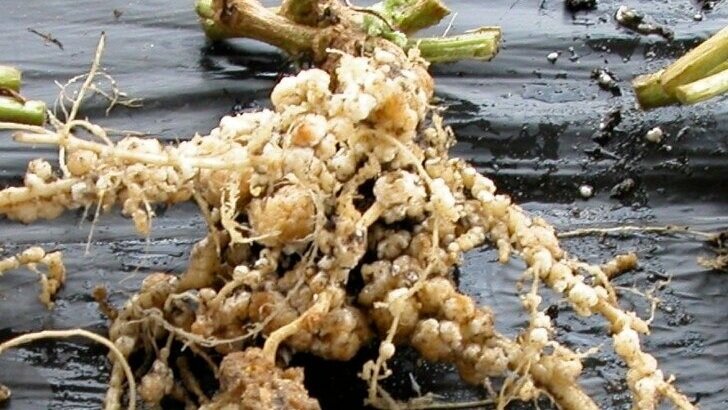M. e. Infection and Symptoms
Know the disease.
Meloidogyne enterolobii has been reported to be highly virulent in widely-grown resistant crop varieties (Brito et al., 2004; Castagnone-Sereno, 2012; Elling, 2013). It is a polyphagous root-knot nematode (RKN) species with a host range similar to that of the cosmopolitan M. incognita. The most frequently recorded hosts include many vegetables, e.g. tomato, pepper, watermelon (Yang & Eisenback, 1983; Rammah & Hirschmann, 1985), fruit trees (Gomes et al., 2011), row crops, ornamental plants (Brito et al., 2010) and weeds (Rich et al., 2009).
Typical symptoms include stunted growth, wilting, leaf chlorosis and deformation of plant organs. Crop damage due to this RKN involves reduced quantity and quality of yield, and has been reported to cause losses of up to 40–65 % (Cetintas et al. 2007). M. enterolobii is recognized as a highly aggressive nematode species because it induces more severe root galling than other species of root-knot nematodes.
To find out more about the symptoms in specialty crops, click the links below.
Specialty Crops Impacted by M.e.
FINDMe on Making it grow
Dr. WIll Rutter (USDA-ARS) co PI on this grant discusses M.e. symptoms, detection, diagnosis, and the research our team is doing on this nematode.
Time: ~8 minutes
Solanaceous
Includes crops such as eggplant, tomatoes, pepper, and Irish potato
Cucurbits
Includes crops such as cucumber, watermelon, and squash
Sweetpotato
Members of the FINDMe team at North Carolina State University share a brief overview of Meloidogyne enterolobii (Guava Root Knot Nematode) infection and symptoms typically observed in Sweetpotato.
Time: ~10 minutes
Other Vegetables
Includes crops such as legumes, leafy greens, Cole crops, and root crops



